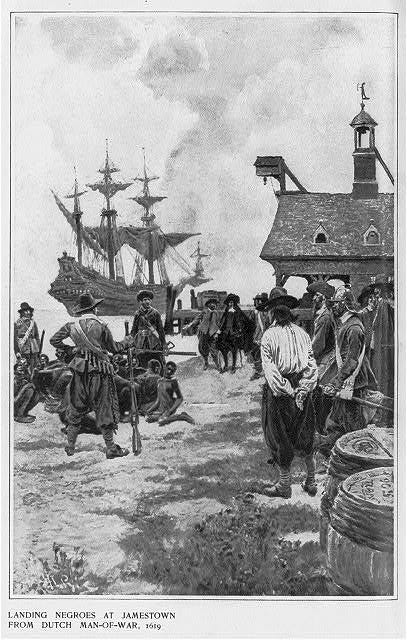By Pamela Hilliard Owens
Please scroll all the way to the end to comment, share, and subscribe. Thank you!
The 1619 Project is a long-form journalism essay developed by Nikole Hannah-Jones, writers from the New York Times, and the New York Times Magazine. The essay, and other later components of the project attempt to “reframe the country's history by placing the consequences of slavery and the contributions of Black Americans at the very center of the United States' national narrative."
The 1619 Project was first published in the New York Times Magazine in August of 2019 to commemorate the 400th anniversary of the arrival of the first enslaved Africans in the English colony of Virginia and in mainland British America.
In 1619, one year before the Mayflower containing a group of Pilgrims landed on Plymouth Rock, a group of "twenty and odd" captive Africans arrived in the Virginia Colony on a ship called the “White Lion.” The enslaved Africans had been captured in an area of modern-day Angola.
In 2017 Hannah-Jones was awarded the MacArthur Foundation fellowship for her work “…chronicling the persistence of racial segregation in American society, particularly in education, and reshaping national conversations around education reform."
Hannah-Jones received the Pulitzer Prize for Commentary in 2020. The award committee cited her "sweeping, provocative and personal essay for the ground-breaking The 1619 Project.
New York University's Arthur L. Carter Journalism Institute named The 1619 Project as one of the 10 greatest works of journalism in the decade from 2010 to 2019. In 2022 Hannah-Jones was nominated at the NAACP Image Award for Outstanding Literary Work – Nonfiction and was recognized with the Social Justice Impact Award.
Hannah-Jones and The 1619 Project was immediately and heavily criticized by several historians and politicians. The historians argued that the series of essays were not historically correct and that the research was flawed. Although Hannah-Jones and the New York Times issued a few clarifications, Hannah-Jones denied the claims that she was “changing” the founding of the United States from the 1776 Declaration of Independence.
Right-wing politicians, including the former president of the United States, went completely apoplectic in refuting the 1619 Project. Laws were passed to prevent the teaching of the essays in schools, and a hastily-formed and error-ridden alternative, the “1776 Project,” was published just before the end of the previous administration.
Some of the contributing authors to the several essays contained in The 1619 Project argue that slavery has shaped modern capitalism and workplace norms, draw parallels between pro-slavery politics and modern right-wing politics, and assert that the United States still has not let go of the assumption that some people inherently deserve more power than others.
Of course, the United States was officially founded when the Declaration of Independence was ratified. Although Africans had been in North America since at least the 1500s, and slavery was in place in other places by the time the “White Lion” ship landed with 20-odd captured people, 1619 is considered the year that slavery officially began in the colonies that would become the United States of America.
The primary premise of The 1619 Project remains that slavery in America “officially” began in 1619 and that slavery shaped not only the growth of the United States in the past, but the oft-ignored achievements of Black people in America have also contributed to the greatness of this country.
Many people in this country want to ignore and/or “whitewash” (literally and figuratively) the history of slavery and racism in America, both of which made America what it is today, for good and for bad.
1619 began the official history of Black people in America. 1776 began the official history of the United States.
We can and should acknowledge both.




